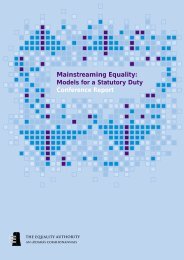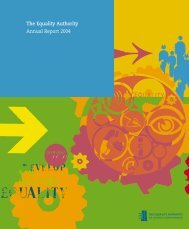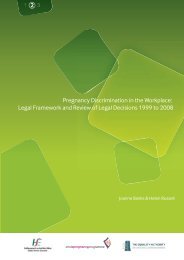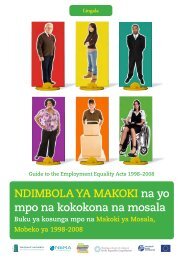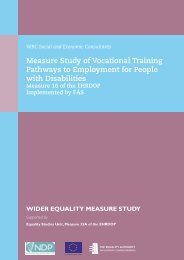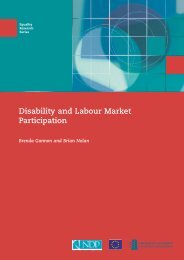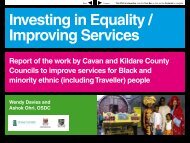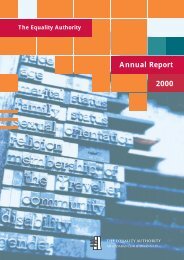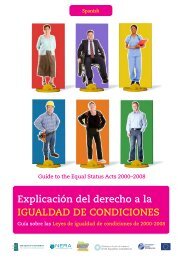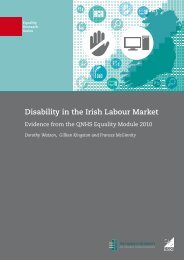Equality and Diversity - Building a Culture of ... - Equality Authority
Equality and Diversity - Building a Culture of ... - Equality Authority
Equality and Diversity - Building a Culture of ... - Equality Authority
Create successful ePaper yourself
Turn your PDF publications into a flip-book with our unique Google optimized e-Paper software.
What Do We Mean By <strong>Equality</strong><br />
<strong>Equality</strong> can mean different things to different<br />
people based on their values, beliefs, life<br />
experience <strong>and</strong> view <strong>of</strong> the world. However,<br />
in order to explore equality <strong>and</strong> diversity it<br />
is important to clarify what we mean. This<br />
is also important because legislation <strong>and</strong><br />
policy has informed <strong>and</strong> been informed by our<br />
underst<strong>and</strong>ing <strong>of</strong> equality.<br />
<strong>Equality</strong><br />
<strong>Equality</strong> is about protecting people's rights.<br />
Under equality <strong>and</strong> anti-discrimination<br />
legislation in Irel<strong>and</strong> <strong>and</strong> Northern Irel<strong>and</strong><br />
people's rights are protected in employment<br />
<strong>and</strong> in accessing goods <strong>and</strong> services on certain<br />
grounds for example, gender or race. <strong>Equality</strong><br />
does not always mean treating everyone the<br />
same. For example, different students may<br />
require different supports to ensure that they all<br />
have the opportunity to sit <strong>and</strong> pass exams. The<br />
following paragraphs outline different types <strong>and</strong><br />
levels <strong>of</strong> equality.<br />
Basic equality All human beings have equal<br />
worth <strong>and</strong> importance <strong>and</strong> are therefore<br />
equally worthy <strong>of</strong> concern <strong>and</strong> respect.<br />
Example – everyone, no matter how much<br />
they earn, have equal worth <strong>and</strong> importance as<br />
human beings.<br />
Liberal equality builds on basic equality <strong>and</strong><br />
assumes that there will always be major<br />
inequalities between people because <strong>of</strong> their<br />
status, the level <strong>of</strong> resources available to them,<br />
their employment, <strong>and</strong> the level <strong>of</strong> power<br />
they have. These inequalities can be managed<br />
by strengthening the minimum to which<br />
everyone is entitled <strong>and</strong> promoting equality<br />
<strong>of</strong> opportunity so that people have the same<br />
chance to compete for advantage.<br />
Example – some people have the resources to<br />
access third level education while others do not.<br />
Everyone should have the same opportunity to<br />
access third level education if they wish.<br />
<strong>Equality</strong> <strong>of</strong> condition builds on basic equality <strong>and</strong><br />
liberal equality. This idea <strong>of</strong> equality emphasises<br />
that inequality is rooted in the social structures<br />
<strong>of</strong> society <strong>and</strong> that these structures can be<br />
changed. How these structures need change<br />
requires debate <strong>and</strong> discussion.<br />
Example<br />
research in Irel<strong>and</strong> has highlighted that male<br />
earnings exceed female earnings i.e. there is<br />
a gender pay gap. A contributing factor is that<br />
women are penalised as a consequence <strong>of</strong><br />
taking time out to meet family responsibilities.<br />
Addressing the gender wage gap requires<br />
targeted positive action to promote gender<br />
equality in the workplace. It also requires<br />
the development <strong>of</strong> policies <strong>and</strong> practices to<br />
support greater sharing <strong>of</strong> care roles in society<br />
between men <strong>and</strong> women.<br />
Key <strong>Equality</strong> Questions<br />
The following tool is useful when exploring any<br />
equality issue or theme<br />
<strong>Equality</strong> is about outcome <strong>and</strong> opportunity:<br />
Do individuals <strong>and</strong> groups have equal access to<br />
the resources or supports necessary to ensure<br />
that they have the same opportunities <strong>and</strong><br />
outcomes – for example in work or school?<br />
Are assumptions made about who people are<br />
<strong>and</strong> what they can do?<br />
What needs to change to make sure that<br />
those who need additional resources <strong>and</strong><br />
supports can access them?<br />
<strong>Equality</strong> is about respect:<br />
Is respect for difference visible or invisible in<br />
society, community, school or family?<br />
Is everyone included equally <strong>and</strong> treated<br />
with respect?<br />
Are assumptions made about who people are<br />
because <strong>of</strong> the group they belong to e.g. older<br />
people, men, women, people with disabilities,<br />
Travellers, lone parents, Muslims, Catholics,<br />
gay, lesbian, migrant workers or others?<br />
Are there stereotypes about particular<br />
individuals/groups that cause disrespect?<br />
Is respect for diversity visible in schools <strong>and</strong><br />
communities?<br />
Do school <strong>and</strong> community events/activities<br />
respect <strong>and</strong> value diversity?<br />
<strong>Equality</strong> is about participation:<br />
Who makes the decisions in society /<br />
community?<br />
Are some voices absent?<br />
Are some voices stronger than others?<br />
Is every effort made to include all voices?<br />
Introduction 7



